Which sizes of plant containers do I need?
I would invest in a variety of different sized containers if I were you. Your plant will grow before your eyes at a faster rate than you could imagine. You will need to transplant it eventually as it grows working up from a small plant pot to a large one.
You will probably need the large ones more often. This is because eventually, you will have more adult plants compared to young ones. Get yourself a large abundance of those and thank me later.
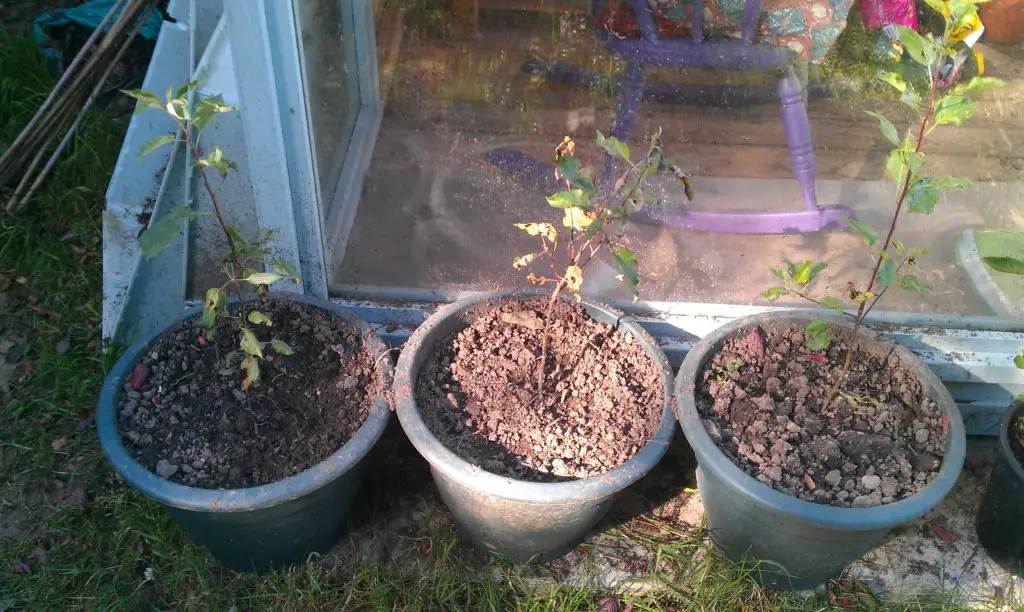
How much space do I need for growing fruit & vegetables?
It all depends on what food and how much of it you want to grow. Obviously, more space means more food. On the other hand, maybe being short on space is a good thing if you’re a beginner. Allow me to elaborate.
You may only want a couple of plants going at one time to at the start in order to make it easy for yourself. Someone learning how to juggle doesn’t start with 9 balls at once. They begin with two and then work up to more as they improve.
The type of plant is also a factor. Strawberry plants don’t take up that much room. However, apple trees will need more space as they can be deep-rooting.
Potato plants are cool because I find that you can plant other things on top of them. Doing this saves you space seeing as they’re root vegetables.
Your fruit and vegetables need to be far enough apart so they aren’t sucking the life out of each other. Think spacious, not cramped, just like interior decorating in the home.
Does it matter if I don’t have much land for gardening?
Not having a lot of space isn’t really a huge issue in gardening. Where can I grow my own food? You can grow fruit and vegetables just as easily out of a window box. This is great if you live in an apartment with just one or two windows.
You can do this just as simply as using a plant pot as you could with a large plot of land. Of course, you are limited by the amount and variety of food you can grow if you only have modest space.
Can I grow food outside of my own property?
You would probably get the most out of this if you grow food from a private garden. It’s possible to use a communal garden or allotment with permission if you are all out of options.
It kind of depends on how much land you own. You may not have much of a plot to speak of at your disposal. I suggest you maybe consider kindly asking friends and family.
You might have be able to utilize some of their land for gardening. I have done this before and the people in my circles have always been very open to the idea.
I know people who completely neglect their overgrown back yards so it’s always worth asking. You may even be helping them out by making it look nice for them. Who’s really doing who the favor here?
Where should I place my plants?
You will need to position your plants somewhere you believe that they will receive plenty of heat and sunlight. There’s the option of placing them outside. Although, you will need to ensure that you put in measures to protect them from wild animals.
A good compromise might be to put them indoors next to a large window. This is fine providing that they get lots of air at the same time.
If you are going to leave your plants outdoors then it may be best to place them high up. You will need some kind of raised platform. You could use an old table, hanging baskets, or improvise by building or buying something yourself.
It will be harder for pests to eat away at your fruit and vegetables now that they are up off the ground. That’s unless they can climb like spider-man of course.
You may even want to dig up your part of your lawn and design a bed specifically for growing your crops. You can even arrange it by having all the same type of plant in one area.
This is handy for me as I sometimes forget which plant is where. This is especially true during early development when you can’t really tell what the plant is exactly. Label and organize your garden how you see fit.
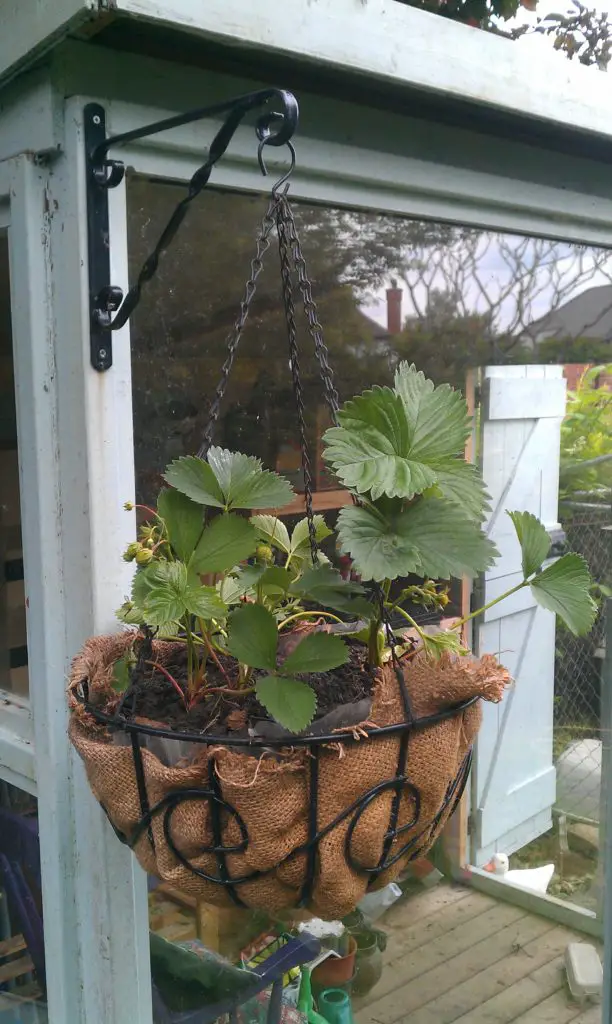
Can I grow fruit & vegetables indoors?
Some plants grow well indoors, but some don’t. I can understand why you would want to do this. It’s nice to have some plant life and greenery inside the home when it’s not good to be gardening outside. It’s great to bring nature inside.
You will need to ensure that your plants are getting all the things that they are missing out on by not being outdoors. For this reason, it can be extra work. Sunlight and water are the two main concerns.
One big advantage of indoor gardening is the lack of pests that will attack your fruit and vegetables.
Clearly, the walls of your house are a strong barrier to protect plants from any outside interference. They will be close by so you can keep an eye on them more easily.
You can use propagators and greenhouses. These are used is in order to make the growing season start earlier and end later, thus lasting longer than it normally would.
This is especially helpful if you are growing exotic fruit and vegetables. These may not normally work well in your country of residence without assistance.
What kind of soil do I need for gardening?
Plant life can grow in almost any type of earth. How do you think weeds keep spring up all the time so easily? Although, different soils have different properties. These differences work better for different plants when it comes to gardening.
You need to check the quality of the soil on your land before you think about fruit or vegetable gardening.
You will get a lay of the land by digging 2 or 3 feet deep into your plot. The soil is the primary food source of a plant so it is clearly a vital element to consider.
What should my soil have in it?
The natural earth of your plot could consist of many different things such as:
- sand
- silt
- clay
- stone
- loam
These materials are all good for different uses depending on which fruit and vegetables you grow.
Silt and loam soil types are fertile but on the other hand, they are particularly rare in UK gardens. You may well be somewhere else in the world so just ignore this if it doesn’t apply to you.
If you’re lucky enough to have it then your best bet is a clay texture. Clay is a good all-rounder for growing many crops throughout the year. However, too much clay in your soil can deter root growth.
You will ideally want your soil to be free from large rocks and thick roots from other plants. These things could cause obstructions later on. Roots are tricky to get rid of.
You may just need to work around them if they are too stubborn to remove. You can pick out stones and rocks by hand fairly easily.
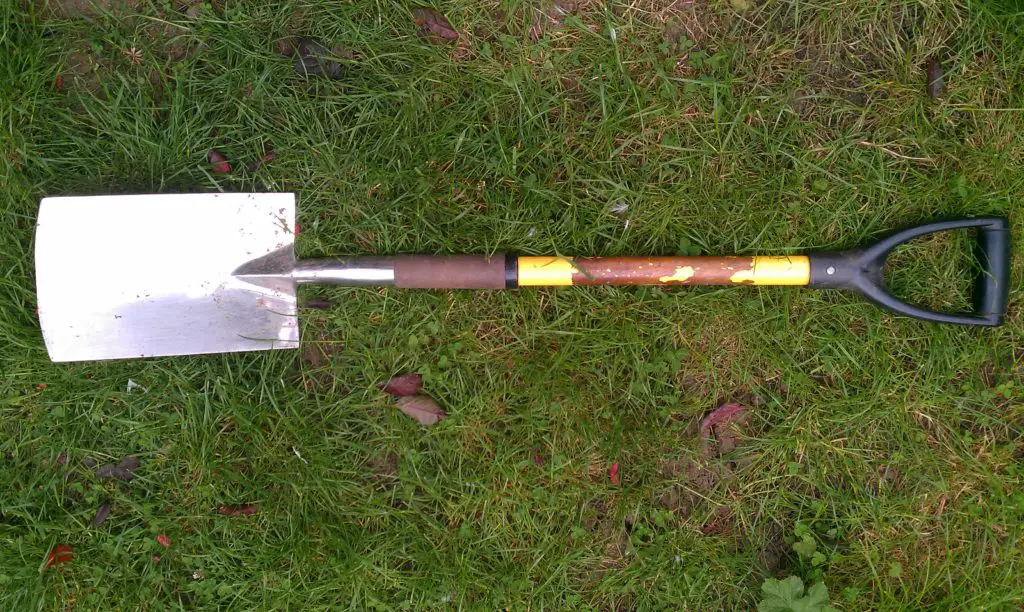
What about the pH level of my garden?
Hands up who paid attention in science class at school? If you did, then you may have learned about the basics of the pH scale. In turn, the pH level is also a factor to consider in gardening.
The acidity and alkaline tendencies of your soil will determine how you go about growing food. Too much or too little acidity can harm certain species of plants.
I believe there is a pH soil tester kit available that gardener’s can buy to determine what the pH level is on their plot. This might be a good investment for you if you are serious about growing your own fruit and vegetables.
You can even get your hands on pH increasers or decreasers in order to change the characteristics of your soil.
How much soil does each plant need?
It’s better to be overly generous with soil for each plant rather than not giving them enough.
If you don’t give enough soil to each individual plant then you will find that they will dry out faster. This will happen quicker than usual and the roots will also be cramped. Be sure to be generous when dishing out compost.
The more soil a plant has, the more it can spread out and flourish. If you are limiting the amount of soil then it can stunt growth. It can also potentially be a killer if left too long in that restrictive state.
When do I replace the soil in my garden?
Plants will eat away at the nutrients if they have been sitting in the same soil for too long. The earth will tend to sink and degrade leaving some extra space.
It’s always good to use this room to top-up your plants with new soil. They will give them that extra nourishment.
After you have done all this then you will just have to let nature take its course. At the same time, you will be doing all the necessary gardening maintenance work on the regular.
How do I transplant a plant?
Sooner or later, the time will come when a plant becomes too big for its current accommodations. They will need a more spacious home in order to continue thriving.
If you neglect to do this then the results can be disastrous and the plant could potentially die. This is where transplanting comes into play.
When you are digging up a plant in order to transplant it there are a few things you need to know beforehand.
Try not to break any of the major roots when digging. I can understand this might be impossible but keep it at a minimum as a damage control measure.
It’s better to dig up too much rather than not enough. You should dig the whole plant up rather than just the main part of it. This way the plant won’t feel so much like it is being transplanted and should continue growing as usual. You’re kind of tricking it in a way.
This is much easier if you are transplanting from a plant pot. The whole thing should just slide out in a nice plant pot shape. The roots will be conveniently molded inside the container so you are less likely to sever any of them.
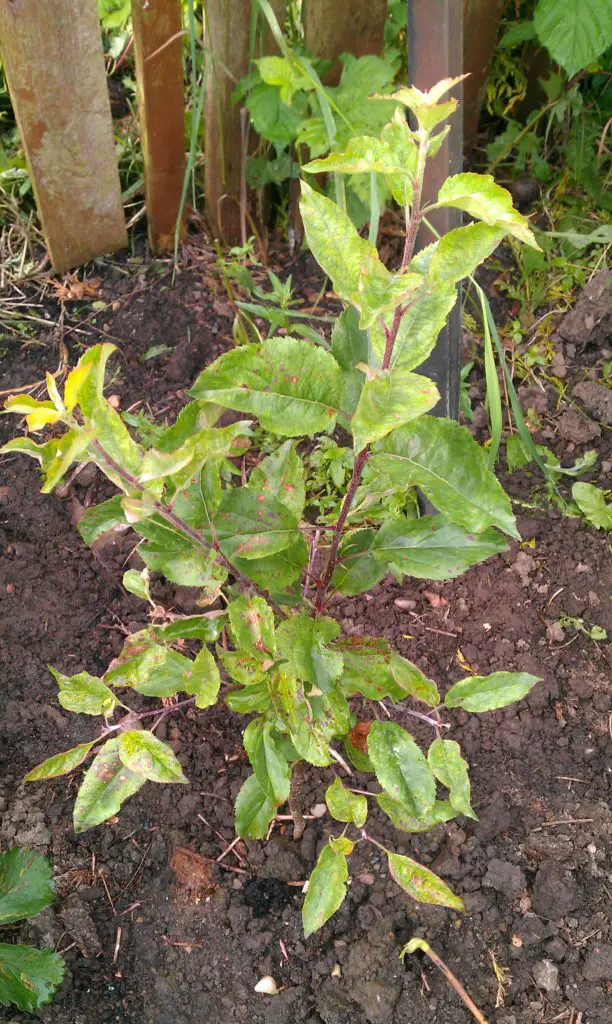
Where in my garden should I transplant to?
Ensure that you aren’t transplanting to a place where there are lots of other plants crammed closely together.
The transplanted plant will already struggle with the new adjustment as it stands. Having to fight for competition with other plants will only make the battle harder to win.
The hole for the plant’s new home needs to be roughly twice as wide and deep as the plant itself. Place the plant in the hole and fill it with earth. You will then push the soil down around the plant like you would do when planting a new seed.
Can transplanting hurt my plants?
Switching containers can disrupt growth although there are ways to rectify this. Whenever you transplant anything into a new container, it is best to water it right away. Remember this from before?
This benefits the nutrients and allows the soil to set in a cement-like fashion. This means that the contents won’t spill out if knocked over. It tends to happen for me when my neighbor’s cats are fighting during the night.
What about garden pests?
What’s the point in growing fruit and vegetables if someone or something other than you is just going to eat them? Why go to all that effort?
Wildlife that wants to feast on your fruit and vegetables will always be an issue I’m afraid. After all, they have to eat to survive just like the rest of us. It’s the circle of life as The Lion King taught us.
Although, you can take lethal or non-lethal gardening measures to prevent pest problems from happening.
You have to be cautious and protect your crops from pests. Slugs, earthworms and other creepy-crawlies may live in the grounds of your plot.
There are even birds and flies that eat away at high hanging fruit. I have a plum tree so I know this all too well. Pests mostly come out at night-time when it is quiet and relatively safe for them.
Certain animals can be an asset to your plants, but other pests can harm growth. Pests may damage parts of the plant such as leaves which will only make life harder. Another danger of garden pests is that they spread viruses and diseases to your plants.
How do I deal with pests attacking my garden?
You can use chemical products to tackle this problem. Conversely, some people also like to use more natural solutions.
If you have pets like myself then I would steer away from using chemicals. Some of these products are capable of killing cats and dogs.
I keep ducks and chickens in my yard so I personally avoid using any strong gardening bait. This is just in case any of my animals peck anything up. Alternatively, you can use methods like:
- slug pellets
- bait
- copper tape
- beer traps
All of these measures should deter pests away from our fruit and vegetables.
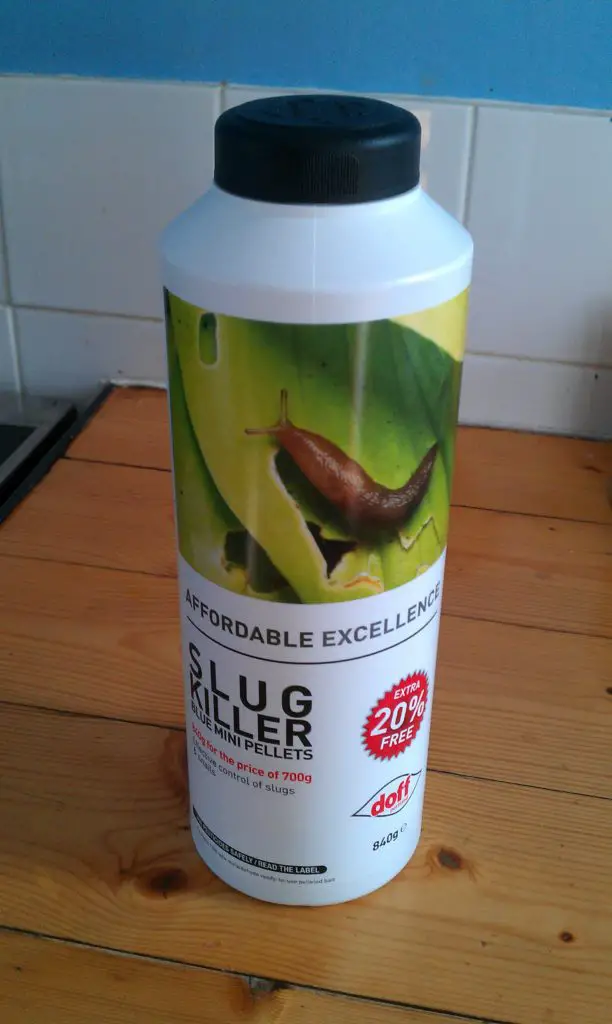
Should I use a chemical treatment on garden pests?
Pesticides and insecticides are options in fighting garden pests. If I’m honest, you could probably still cope just fine growing food without ever using them.
A plant has natural defense mechanisms to defend itself against pests. You may not need any chemical treatment.
This is all true if your plants are healthy, well watered and fed. Whereas a neglected plant would struggle to survive against a pest attack when it’s not at its full strength.
Bacteria and fungi can harm your fruit and vegetables. You could always use chemical products to tackle those problems.
Be very careful when using chemical treatments. These can kill the helpful insects if you use them too frequently. You don’t want to kill the bees that pollinate your plants now do you?
Another downside of chemical usage is the harm it could potentially do harm to your crops. It can damage the surrounding environment too. If I ever use chemicals, I always use them sparingly.
Do I need to use pest deterrents at all?
If you are prompt when it comes to harvesting then you won’t need to worry too much about pests.
It’s wise to be on the ball when it comes to harvesting ripe produce. You need almost ninja like reflexes. Start picking the instant your fruit and vegetables turn ripe.
If you take your eye off the ball even for a moment then garden pests will not waste time. They will take advantage of the leeway that you give them.
Why do I need to till the soil in my garden?
Before even thinking of planting, you will need to thoroughly till the earth in your front or back yard. Do this until it has all broken down into smaller, more manageable fragments.
If you’re buying a bag of compost then you won’t need to do this do any tilling or ploughing. Clearly, the compost will already be a good consistency.
You will need to buy lots of bags if you want this to work. Typically, you would do this instead of using the earth belonging to you that’s already on your land.
A new crop has a better chance of success if the soil is fine as it can then root more easily. Big clumps of untilled dirt will be resistant to any roots trying to pass through.
The tilling process also allows you to weed out rocks are any other stubborn debris. These will stunt growth and inconveniently get in the way.
Tilling also makes the soil a lot looser. This is ideal for you during the planting process rather than being flat, stiff and compacted. It will make digging holes for seeds and new plants a whole lot less strenuous.
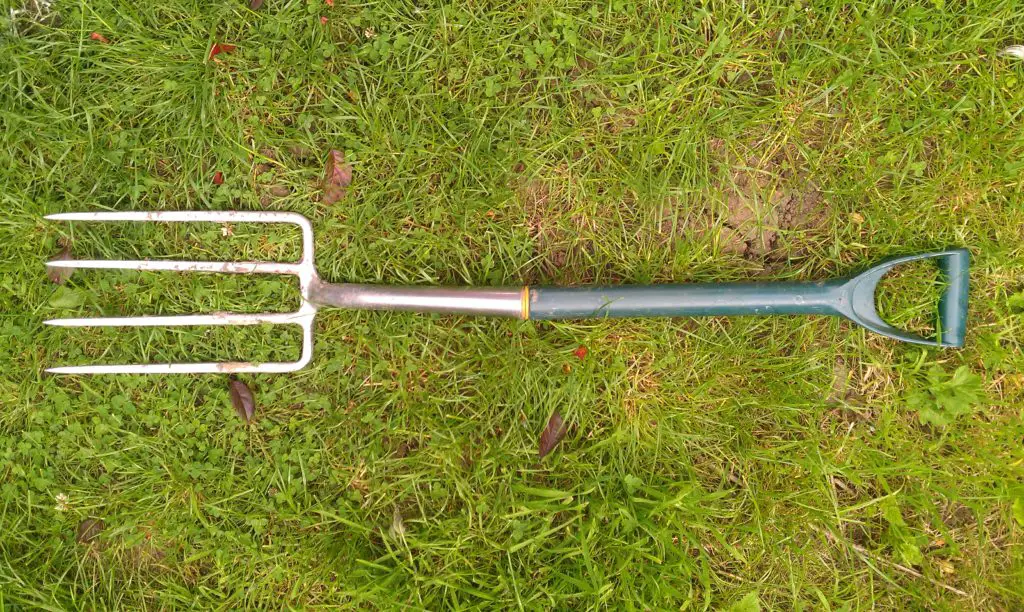
How do gardeners deal with weeds?
You can either apply weed-killer to weeds or you can dig them out the old fashioned way.
You should weed regularly. Weeds can compete against your crops taking away vital resources like water and sunlight. This will have a negative effect on growth as we’ve already seen.
You will need to clear your plot of any weeds before going ahead and growing food. This will help you spot the difference between weeds and your fruit and vegetable shoots later on in the growing season. It’s a common mistake to dispose of a plant while mistaking it for a weed.
Don’t give weeds the chance to take over and become deep-rooted in your garden. You will be overgrown before you know what’s happening.
The longer the weeds survive, the harder it’s going to be to remove them. I know weeding isn’t the most exciting gardening task in the world (I hate it) but you still need to do it.
Why is weeding so important in gardening?
You will need to remove any:
- grass
- weeds
- any other unwanted plant life
All of these may take resources away from the fruit and vegetables that you actually want to grow. This is not a one and done kind of gardening job. You will need to weed regularly as and when they crop up.
Should I use chemical treatments on weeds?
You can use weed-killer to kill weeds as mentioned before. At the same time, I have discovered that it will also eliminate whatever else is nearby. This can be anything from grass to other plants.
Chemical treatment only works primarily on weeds that are isolated from anything that you want to survive. If this is not the case then you would do better just to pull them out by hand.
Should I make my own garden compost?
Yes, this is always a good idea. It costs next to nothing to create and your fruit and vegetables will love you for it.
You are better off doing this than spending cash on expensive bags of store-bought compost. Your home-made compost will probably be of better quality too.
You should make a habit of frequently mixing up your compost. This will aid the decomposition process too. I do this thoroughly with a long garden fork.
What goes into my compost?
Compost is made out of biodegradable material such as:
- banana peel
- grass cuttings
- faeces (eww I know)
- potato skins
- leaves
- all other manner of food waste
There is no real gardening work involved as you just use what you would otherwise throw out anyway.
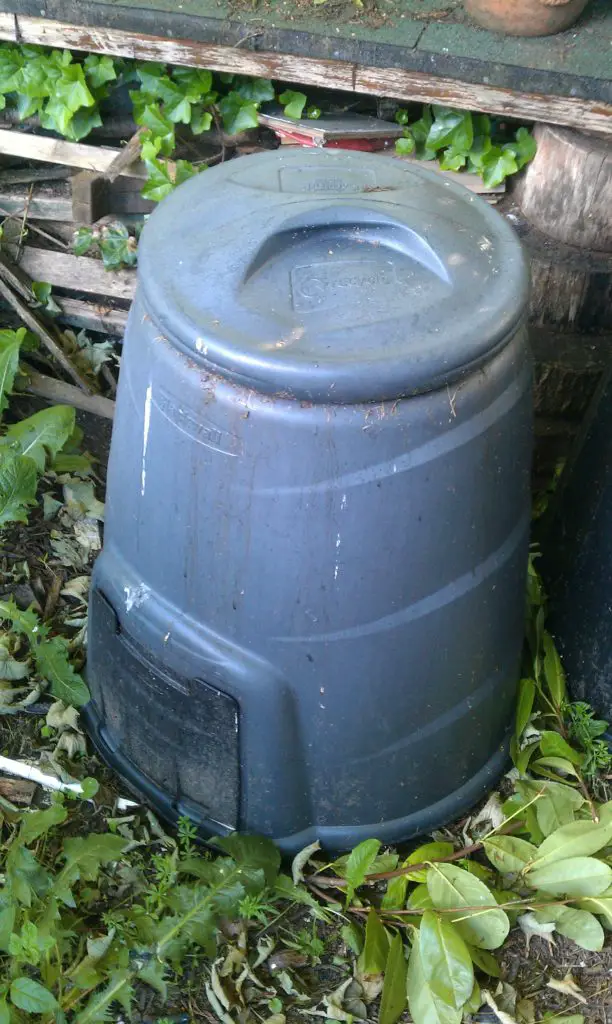
How do I use my compost when gardening?
Decomposition takes a hell of a long time. You should know when you reach this point as the final product will look like a fine soil.
When it is finally ready you can spread it around your fruit and vegetables. You can watch them flourish from the effect of all those extra nutrients. You can also mix it together with your soil to make a blend of nutritional goodness.
Should I buy or make my own compost bin?
You can buy a compost bin, throw in any natural waste and let it do its magic. Follow my example and try to get a plastic compost bin. This will store heat better which will in turn help decomposition.
I once made a compost bin out of salvaged wooden palettes tied together with rope. Get creative and you won’t even have to spend any money. You can also improvise by using an old metal barrel instead.
Can I propagate my fruit & vegetables?
Have you ever seen that old stock footage of cells dividing rapidly under a microscope? You will find this in literally every science documentary ever in existence.
Two becomes four, four becomes eight, eight becomes sixteen and so on. Garden propagation is a little bit like that.
This is a great plan for increasing your yield of fruit or vegetables. It will also save you money as it has me seeing as you won’t have to purchase new seeds or plants.
Some crops are perennial and others will stop producing fruit after a certain number of years. It’s always good to get into the habit of starting brand new growers. This is better than putting all your chips on the existing ones. No fruit or vegetable plant lasts forever.
It is best to perform plant propagation in the Spring or Autumn/Fall. Let’s say you wanted to propagate a plum tree. Try to find a fleshy green branch to cut off rather than a woody one.
When you’ve done that, dip the severed end of it into rooting hormone powder. Afterward, stick it firmly into a plant pot full of soil. You don’t need to bother digging a wide hole for it.
How do I propagate a strawberry plant?
Strawberry plants are awesome and I’ve grown them enough times to say that they’re very easy to propagate.
You will execute propagation in different ways depending on the plant. For example, you propagate strawberry plants by using shoots rather than cuttings.
These shoots will branch off from the older plants. These are commonly called “runners“. The runners will grow out during the middle to the end of Summer.
You will need to wait for the runners to form leaves at the ends. When this happens your job is to replant the ends of these runners into plant pots full of soil. Alternatively, you can plant them directly into the ground if there is some space nearby.
You will only want to plant them at a very shallow level so the leaves are sticking out of the top. The leaves will need light so roots can begin to anchor into the soil.
You will barely need to plant them at all in fact. The runners that you don’t do anything with will naturally try to root into the earth regardless. They are very self-sustainable in this sense.
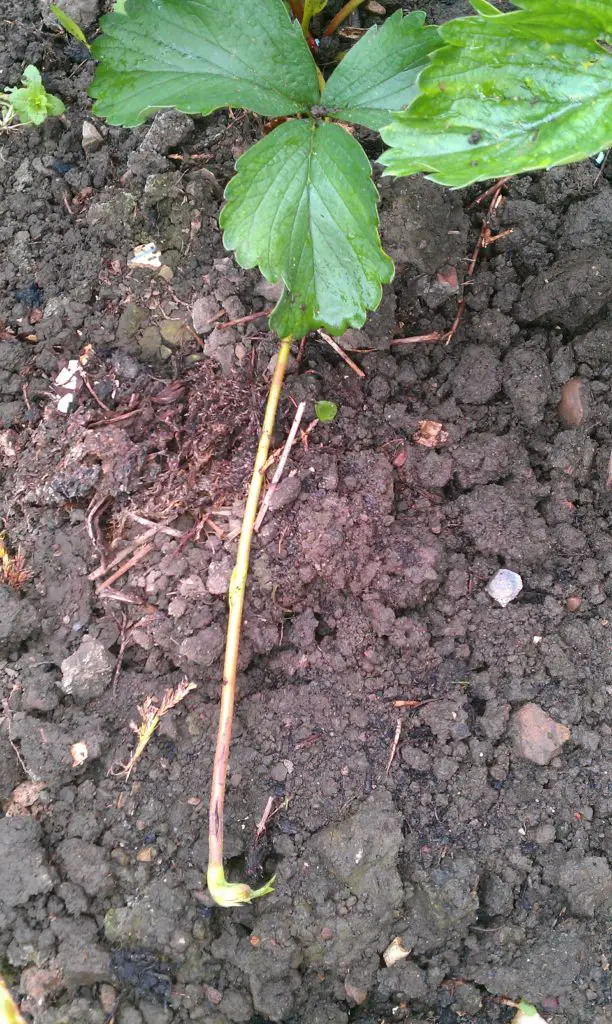
When do I cut the runner shoots off?
Once propagation is complete, you will essentially have a brand spanking new strawberry plant. Ever wanted to deliver a baby? You can cut the runner off with some secateurs like you would with an umbilical cord. Good job, Doctor.
Only do this if you believe the new plant is healthy enough and can survive on its own. There’s no mad rush to sever the runners right away.
You might want to wait for the runner to shrivel and go brown before you do this. I mostly do this just to steer on the side of caution.
How do I propagate a potato plant?
Here’s another instance of propagation. If you had a potato plant then you would save one harvested potato and then let it age for a little bit. After a while, it will then likely sprout fleshy, yellow growths which is exactly what you want.
This should sort of remind you of your own face as a teenager (if you’re anything like me). Sorry for that mental image.
We all love potatoes, but at the same time, you may have some left over that you haven’t eaten yet. These are ideal subjects for propagation.
At this point, you would replant that old potato in the ground. It will then produce a new harvest of additional potatoes from those growths.
Does propagation always work in gardening?
Propagation isn’t 100% reliable so don’t be too disappointed if it doesn’t work out for you. The process can fail sometimes no matter how great a gardener you happen to be. You may in fact be the Bruce Lee of gardening and you can still fall flat on your face.
A lot of it is luck so if you do try propagation then maybe you should do it multiple times with a large sample size.
You might at least have one or two successes among the failures if you play it this way. Take my advice because this will give you lots of chances to get it right.
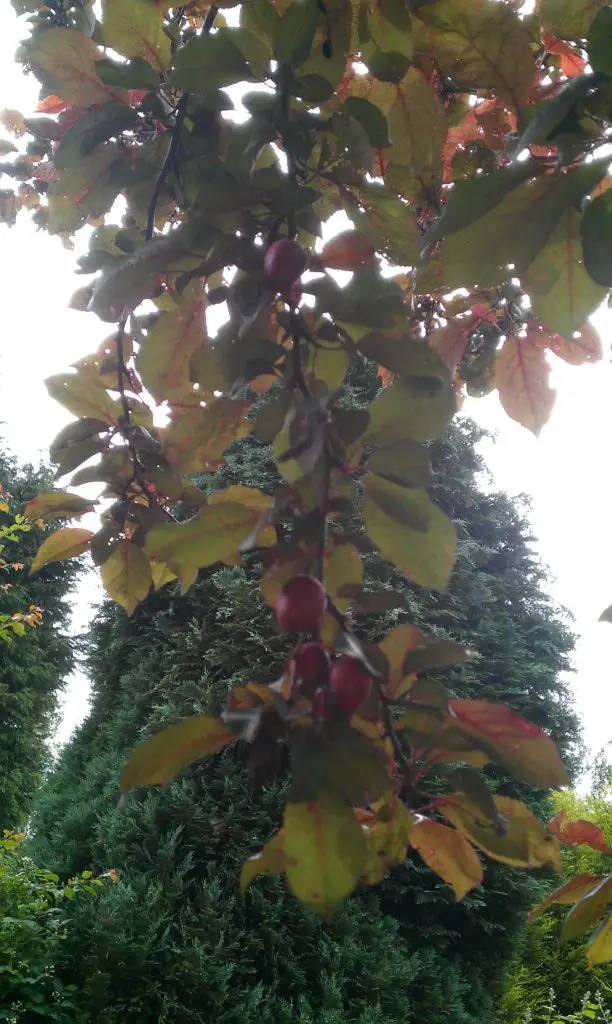
How do I store my fruit & vegetable produce?
You may not have to find ways to store your harvest of fruit and vegetables at all. It might be the case that you are going to gobble them up immediately or a few days after picking.
I don’t blame you. Although, I can definitely understand wanting to save your produce for a later date.
You can then eat them on another day of your choosing further down the line. You might even want to stockpile food so you can plan your meals ahead of time.
Can I freeze my home-grown food?
You can extend the life of your fruit and vegetables for a few days by placing them in the refrigerator.
Freezing can be an option but I should warn you that this produces mixed results depending on what is that you’re freezing. Some fruit and vegetables freeze better than others, some produce won’t freeze well at all.
I can even think back to one Summer when I had a huge harvest of juicy plums. This makes sense as I have numerous plum trees in my garden. I froze these babies and kept them for many months in my chest freezer.
There was a lot to get through and they managed to last me almost a year. You wouldn’t believe how much money I saved on food.
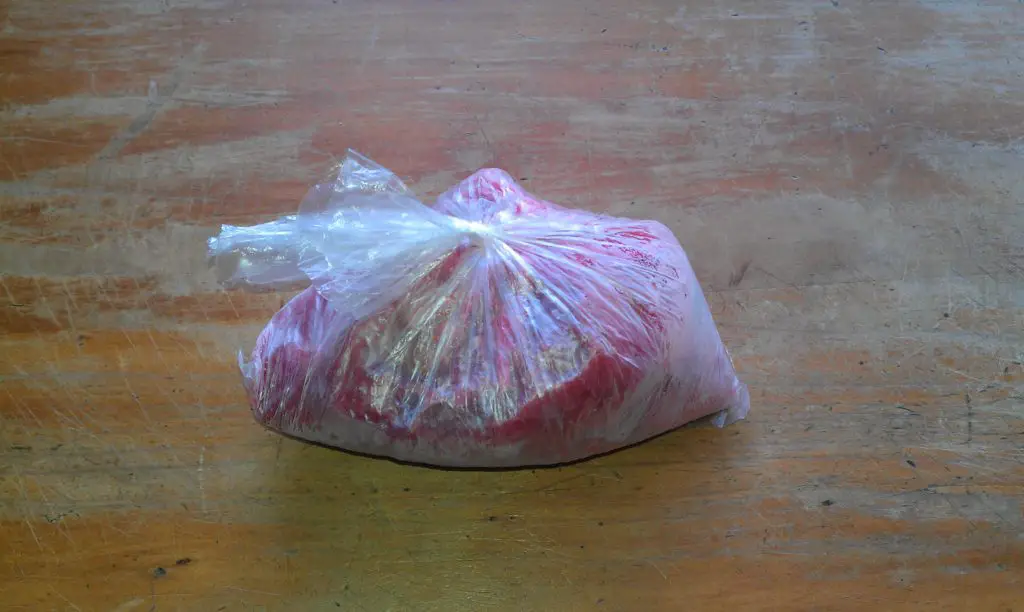
How do I prepare fruit & vegetables before freezing?
You can freeze them straight from fresh. However, it might be a good idea to prepare your fruit and vegetables in another way. For example, I may want to freeze apples for let’s say, a pie filling. In this case, I would:
- Harvest your ripe apples
- Peel
- Core
- Slice them up into small pieces
- Wash
- Cook the apples until they are soft and tender
- Put them into food bags
- Wait for them to cool
- Place the bags in the freezer
They will keep a lot better this way rather than throwing whole raw apples into your freezer. If you have some fruit with stones in them then clearly you will need to de-stone them first prior to freezing.
Freezing a raw apple without any preparation can drastically affect its consistency after you defrost it. The extended freezing process may ruin the texture and flavor.
On the other hand, I’ve had experiences before where I’ve frozen blackberries and raspberries. I didn’t even need to do anything special to them apart from one task and they turned out fine.
This task was to submerge them in saltwater to kill any pests. It is very simple, let me take you through it step by step:
- Harvest your ripe fruit
- Place them all in a large bowl
- Fill the bowl with cold water so all the fruit is submerged
- Sprinkle a generous amount of salt into the bowl
- Mix thoroughly with a large spoon
- Wait for an hour while mixing at short intervals
- Drain out all the saltwater, refill with more cold water and then drain once more
- Put all the fruit in food bags
- Place these bags into the freezer
Is freezing home-grown food always a good idea?
The freezing process can have an adverse affect on the overall taste quality of your fruit and vegetables. You may want to eat the produce fresh, right away while it’s in its prime.
Freezing is by no means a terrible idea. If you do decide to freeze your produce then you may want to blanch beforehand.
How will gardening help with my cooking?
It’s a smart idea to grow herbs inside your kitchen next to a window rather than outside in the garden. This way you can easily and conveniently access fresh herbs and use them in your cooking.
The taste of fresh herbs and spices make a significant impact to your meals. They are great when you compare them to the mediocre dried herbs you get in the supermarket.
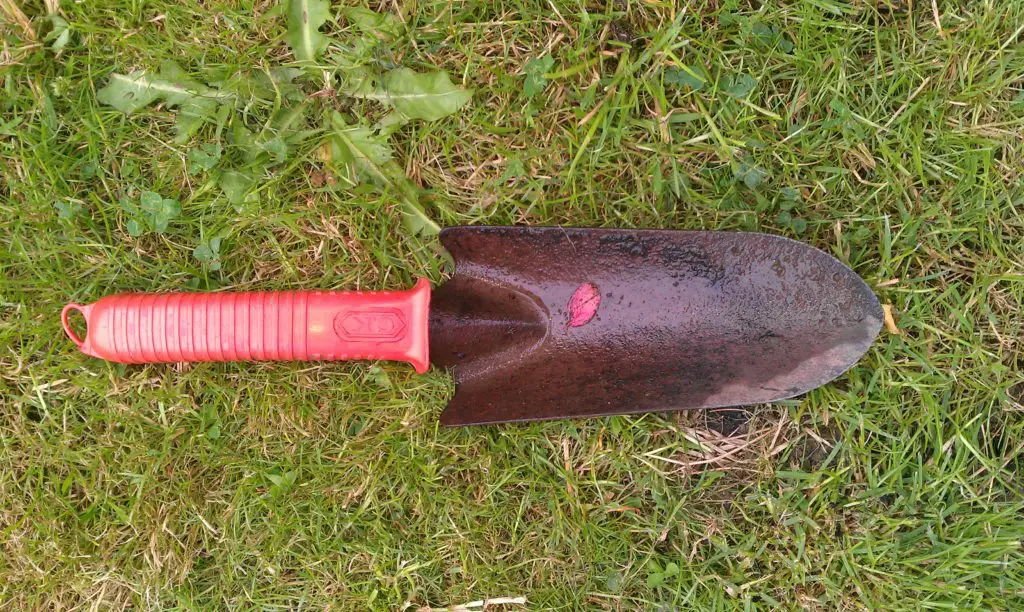
How natural is it to grow your own fruit & vegetables?
The food that you eat is clearly something that you have grown yourself. For this reason, you will know the exact process that it has gone through. After all, you are there tending your garden every step of the way under your own close surveillance.
You can be confident that your plants haven’t been tampered with in any way. You might want to avoid spraying your fruit and vegetables with chemicals. It’s not always good to modify them with anything artificial like preservatives or other additives.
The produce that you will grow whilst gardening will likely be a lot healthier and more nutritional than most other food. Probably even more so than food bought from a store.
Will I be protecting the environment by gardening?
Many countries make the mistake of importing food that they can easily grow on home soil. You will be able to combat this if you grow your own food. You will also reduce the amount of plastic packaging used for fruit and vegetables. Good for you, eco-warrior!
In addition, growing food and gardening means that you can help out the environment. You will be doing this from a logistical standpoint. This is due to the lack of miles your home-grown fruit and vegetables have to travel, thus reducing your carbon footprint.
Get the idea of bananas riding unicycles out of your head. That’s not what I’m talking about here, silly. I’m talking no more gas-guzzling planes and cargo ships transporting food.
You will be safe in the knowledge that your home-grown fruit and vegetables will be cheaper. They will be environmentally sound too.
Another thing to think about is the amount of excess food that supermarkets end up wasting. They will ultimately be throwing all of it away into landfills. There is a better chance for you as an individual gardener to be much less reckless and wasteful.
Will my pets be a problem when growing food?
I personally love animals. Although, they can sometimes be an obstacle when it comes to gardening and growing food.
Not to be biased but I’m mainly talking about dogs here rather than cats (sorry dogs). My dogs are pretty wild. Although, if your animals are calm and well-behaved then there shouldn’t be an issue.
Energetic dogs may trample your fruit and vegetable plants which can be a problem. You should plan your plots out so that they are a fair distance away from where your pets go. I’m talking about paths and anywhere else your dogs will run around and play.
If your produce is ripe then you will want to make sure that your animals or any other pests don’t eat them. They will fall to the ground eventually and you want to be the first person on the scene when they do.
I know this isn’t a pleasant thought but you could use animal excrement as a fertilizer. My tip is to just pop it into a compost bin and let nature take its course. Excrement from animals on a meat-based diet works best for fertilizer.
This is one way your pets can unknowingly help you out when it comes to gardening. On that joyous note, I will bring this very long post (my highest word count ever … so far) to its conclusion.

I hope you found at least some of this gardening information useful. You may have even learned something you didn’t know before about how to grow food.
There are so many advantages to growing your own fruit and vegetables. On the other hand, you have to put in that extra work. This is especially true at the start of your journey as an amateur gardener.
We can learn that not only can we save cash, we can also teach ourselves not to be so reliant on big, multi-million dollar supermarkets (handy as they are). We know the ingredients and conditions needed for plants to live long lives too.
I suggest your next move might be to go to your nearest garden center or shop online. You can then find the very basic gardening equipment that you will need to grow food.
Go ahead and do this if you don’t already have the necessary gear. You might want to invest in a few gardening books while you’re at it. This is purely just to help you sharpen your skills even more.
As a preparation, I recommend the next thing on the agenda should be to dig up and weed the patch of land you want to use. It will then be ready whenever you want to start growing fruit and vegetables.
It may be the case that you are still in need of gardening assistance. If you have any more questions I have put together another post called 44 Great Gardening Tips For Growing Succulent Fruit & Vegetables. I think you will find this to be really useful.
Do you have any prior gardening experience? What is your favorite fruit or vegetable to grow and eat? How much money do you think you will save on your food shopping bill by growing food?
Please don’t forget to share this with your friends, like it on social media, subscribe to our newsletter and comment below. Thanks for reading!
Related Posts:
Earn $9,500 Per Month With Your Own Woodworking Business
Ultimate Planting & Harvesting Timetable For Fruit & Vegetables
Want Free Eggs? Learn How To Keep Chickens & Earn Cash!
Receive Infinite Free Samples & (Almost) Never Shop Ever Again!
Scan Bar Codes & Earn Big Rewards With Shop and Scan
Earn Money Back On Your Purchases With Cashback Credit Cards
